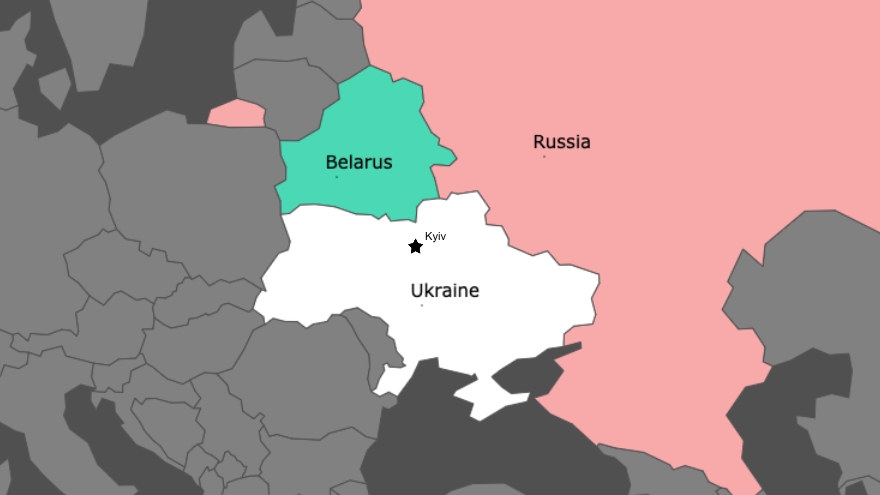Moscow has inked a deal to formalize the deployment of Russian tactical nuclear weapons in Belarus, citing escalating tensions with NATO and the West as the reason for the new agreement.
“Amid a sharp exacerbation of threats on the western borders of Russia and Belarus, a decision on countermeasures in the military-nuclear sphere was made,” Russian Defense Minister Sergey Shoigu said at a meeting of the Defense Ministers’ Council of the Collective Security Treaty Organization (CSTO) in Minsk.
Russia has transferred to the Belarusian armed forces nuclear capable Iskander-M tactical missile systems, along with Su-25 combat planes re-equipped to carry nuclear weapons, Shoigu said.
The defense chief also added that Belarusian military personnel have already undergone the necessary training.
Belarus shares nearly 700 miles of border with Ukraine, while Ukraine’s capital city of Kyiv sits closer to the southern tip of Belarus than Russia.

(Adrian Norman/Timcast News)
The heightened threat of tactical nuclear weapons being used in the region comes days after militants crossed into Russia from Ukraine, attacking multiple targets and forcing an evacuation.
Russia’s defense ministry blamed Ukrainian authorities for the cross-border incursion, stating that Russian forces defeated the enemy fighters with air strikes, artillery fire, and action by border units, which resulted in the weather of more than 70 Ukrainian fighters.
Recent nuclear drills involving NATO forces are also cited by Moscow as the basis for an increased nuclear posture near Ukraine.
“In the conditions of an extremely sharp aggravation of threats and the activities of NATO’s joint nuclear missions, we are forced to take retaliatory measures in the military-nuclear sphere,” Shoigu said. “In accordance with the decision of our supreme commanders, we’ve deployed Russian non-strategic nuclear weapons on the territory of the Republic of Belarus.”
Numerous mainstream media outlets, along with the current leadership of the U.S. government under the Biden administration, place blame for the conflict squarely with Russia, often referring to Russian President Vladimir Putin’s 2022 invasion of Ukraine as “unprovoked.”
However, this view omits available and archived records showing that U.S. defense officials have warned for decades about what steps the U.S. and NATO should take to avoid such a confrontation with Moscow.
Columbia University Professor Jeffrey Sachs notes two main factors driving the present conflict:
1. The U.S. intention to expand NATO to Ukraine and Georgia in order to surround Russia in the Black Sea region by NATO countries (Ukraine, Romania, Bulgaria, Turkey, and Georgia, in counterclockwise order)
2. The U.S. role in installing a Russophobic regime in Ukraine by the violent overthrow of Ukraine’s pro-Russian President, Viktor Yanukovych, in February 2014. The shooting war in Ukraine began with Yanukovych’s overthrow nine years ago, not in February 2022 as the U.S. government, NATO, and the G7 leaders would have us believe.
As Sachs, who has served as an advisor to three United Nations Secretaries-General, wrote in a recent op-ed:
Biden and his foreign policy team refuse to discuss these roots of the war. To recognize them would undermine the administration in three ways. First, it would expose the fact that the war could have been avoided, or stopped early, sparing Ukraine its current devastation and the U.S. more than $100 billion in outlays to date. Second, it would expose President Biden’s personal role in the war as a participant in the overthrow of Yanukovych, and before that as a staunch backer of the military-industrial complex and very early advocate of NATO enlargement. Third, it would push Biden to the negotiating table, undermining the administration’s continued push for NATO expansion.
On May 25, while meeting his counterpart in Belarus, Shoigu said, “Today, we are being confronted by the collective West, which, in effect, is waging an undeclared war on our countries.”
The same day, Belarusian Defense Minister Viktor Khrenin said the tactical nuclear deployment “will be an effective response to the aggressive policies of unfriendly nations, and we hope that it will make their leaders think about the inadmissibility of a further escalation in the region.”
